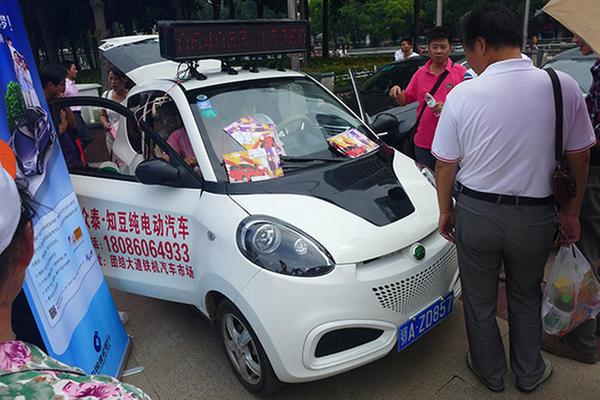Ponycar to expand fleet rapidly
 |
| An electric vehicle, made by Zhidou Electric Vehicle Sales Co Ltd, attracts attention from car buyers during an EV sales promotion event in Wuhan, Hubei province. [Photo/China Daily] |
Car-sharing platform to launch 10,000 EVs in first-tier cities
Car-sharing platform Ponycar said it plans to launch up to 10,000 electric vehicles in China's first-tier cities within a year, as it ramps up efforts to compete for supremacy in the booming sector.
The Shenzhen-based company has already been offering services in Shenzhen and Guangzhou, with a total of over 2,000 EVs, mostly supplied by Zhidou Electric Vehicle Sales Co Ltd and BAIC Motor Corporation Ltd.
"We are going to put 8,000 to 10,000 EVs on the road in Beijing, Shanghai, Guangzhou and Shenzhen within a year and to march into second-tier and third-tier cities in Fujian, Sichuan, Shandong and other provinces in the coming months," Liu Yixun, founder of the company, told China Daily in an exclusive interview.
He said Ponycar has so far established a partnership with more than 200 sites in Shenzhen for users to pick up and return the cars and the number is going to reach 600 sites in the coming two months.
"Charging is not a difficulty as we charge the cars together in major cooperative sites with sufficient charging facilities at night to ensure that they can run 160 to 180 kilometers every day," Liu said, adding that average daily revenue of each EV has reached 180 yuan ($26.49).
Ponycar's move comes as its rivals, including Gofun Chuxing and EVCARD, are competing to gain a bigger market share in the burgeoning sector.
Gofun Chuxing, launched by State-owned Beijing Shouqi Group, is currently operating in a number of key cities including Beijing, Shanghai, and Guangzhou. The company said earlier it will expand its presence to 20 cities, with more than 15,000 EVs, by the end of this year.
Following the explosion in bike-sharing services, the car-sharing sector is growing fast in cities across China, especially in first-tier cities where many people are not qualified to buy cars because they do not have quota for getting a car license plate.
"With the government's firm support in promoting car sharing and people's growing recognition of the sharing economy, Chinese car-sharing market is expected to see rapid growth in the coming year," Liu said.
Zhang Xu, an analyst at Beijing-based consultancy Analysys, said the two major challenges facing car-sharing companies were capital and a lack of parking resources.
"Many companies are not able to get enough funding for expansion," Zhang said.
"Meanwhile, they have to rent a large number of parking spaces, which is a big cost for companies."
He added, however, that he had high expectations for the future development of the industry.
"The car-sharing industry will see robust growth once investors see its potential and capital pours into the market."

